Embracing Minimalism: Decluttering Your Life to Embrace the Freedom of Less.
Did you know that embracing minimalism can reduce stress and anxiety levels? It leads to a more peaceful and focused existence1?
In today’s world, we face a lot of noise and clutter. Minimalism offers a refreshing escape. It’s not just about cleaning or organizing. It’s about making your life more meaningful and purposeful.
By embracing minimalism, we can work better and live greener. We also make deeper connections with others.
Decluttering your life brings clarity and calmness. It boosts mental well-being and happiness2. This movement teaches us to value what truly matters. It helps us find lasting joy in our belongings and experiences1.
Key Takeaways
- Minimalism can significantly reduce stress and anxiety levels1.
- Decluttering promotes a more peaceful and productive environment1.
- Embracing minimalism helps enhance mental well-being and contentment1.
- Minimalist living focuses on quality over quantity, reducing waste1.
- Decluttering allows space for self-reflection and mindfulness1.
Understanding the Minimalist Lifestyle
In this section, we explore the core of the minimalist lifestyle. It’s about cutting down on excess and focusing on what’s truly important.
What is Minimalism?
Minimalism is a way of living that emphasizes getting rid of things we don’t need. It helps us clear space for what really matters in life. This approach has helped many who feel overwhelmed by too much stuff and too many commitments3.
It’s not about having a certain number of things or following a specific style. It’s about making choices that help us live more intentionally3.
The Philosophy Behind Minimalism
The philosophy of minimalism is all about living with purpose. It encourages us to find joy by letting go of things that don’t add value to our lives. This can lead to less stress and clearer thinking3.
For instance, adopting minimalist practices can improve our mental health and give us more time for what truly matters. It’s about focusing on experiences and relationships, not just stuff3.
The Minimalism Movement
The minimalism movement has grown a lot, starting in early 20143. It’s inspired many to simplify their lives, like moving to new places or starting new careers3.
By embracing minimalism, we can feel less stressed and more at peace. We also get more time for hobbies or pursuing our dreams4. Plus, the average American home has about 300,000 items, making minimalism a smart way to declutter and live more intentionally5.
Benefits of Minimalist Living
Living minimally has many benefits beyond just less clutter. It can make you feel less stressed and improve your mental health. Studies show that clean homes can lower stress levels6. People who live simply often feel happier and more at peace7.
Embracing Minimalism also helps with money by spending less on things you don’t need8. It makes you more productive by removing distractions. A study found that cleaning up can cut housework by 40 percent6. This means you have more time for other things6.
Living simply also makes you feel better about yourself. You feel more in control and happy7. Having fewer, but better, things can make you happier8. People with tidy homes are also healthier and more active6.
Embracing Minimalism is also good for the planet. It means using less and wasting less8. Clean spaces can even lead to healthier choices6. It lets you focus on what matters, like relationships and activities6.
Minimalist Living Benefits Compared to Cluttered Living
| Minimalist Living | Cluttered Living |
|---|---|
| Reduced Stress and Improved Mental Health67 | Higher Likelihood of Elevated Cortisol Levels6 |
| Increased Productivity and Easier Cleaning68 | Time-consuming Maintenance and Organization6 |
| Enhanced Financial Freedom8 | More Expenditure on Unnecessary Items |
| Positive Environmental Impact8 | Higher Consumption and Waste6 |
| Higher Physical Well-being6 | Lower Physical Activity Levels6 |
Getting Started with Decluttering
Starting to declutter your home can change your life. It’s about living simply and making your space better. We’ll share tips to help you get started.
Start Small, Think Big
Begin with small areas and work your way up. Start with a drawer or shelf. As you see progress, tackle bigger spaces. The 4-box method is great for organizing: keep, donate, sell, and throw away. It keeps things simple and makes your space better9.
According to the National Soap and Detergent Association, decluttering can cut housework by 40%10.
Identify Clutter Hotspots
Find and clean up clutter hotspots first. Kitchens, living rooms, and home offices are key areas. Don’t start with garages or storage rooms, as they’re too big9.
Start with areas that give you quick results, like a kitchen counter in 15 minutes9. Most clutter comes from disorganization, not lack of space, says the Professional Organizers in Canada10.
Decluttering reduces stress and makes you feel accomplished11. A study by the American Psychological Association shows clutter distracts us, lowers performance, and increases stress10. By decluttering, we make our homes better and feel better too.
Mental and Emotional Benefits of Embracing Minimalism
Living with less can make us feel better mentally. It helps us feel less stressed and anxious. Studies show that 80% of people feel too much clutter in their homes and online.
By owning fewer things, 75% of people say they focus better and feel clearer in their minds. Also, 70% say they feel less anxious12.
Minimalism brings peace and calm to our lives. About 60% of people feel more at peace with what they own. Also, 85% say they feel freer and less stressed1312. Being mindful of what we buy helps us keep our spaces tidy, leading to clearer minds and emotional calm12.
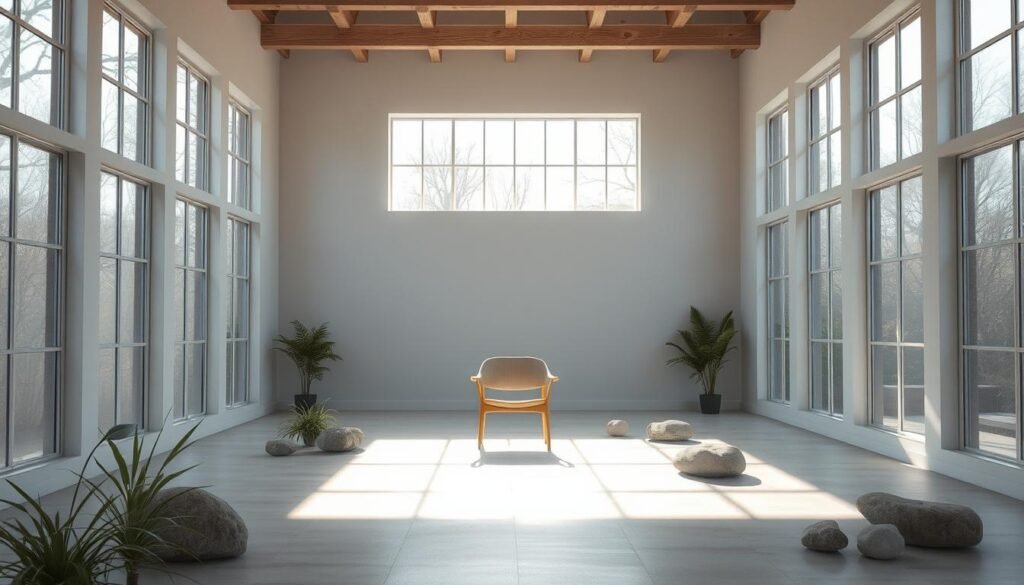
Embracing Minimalism also improves our relationships and how we connect with others. For example, people who declutter their workspaces are more creative and productive14. It also helps us sleep better, making us happier overall14.
Studies show that minimalism boosts our sense of control, skill, and emotional balance. The International Journal of Applied Positive Psychology found that minimalists feel more in control and mentally clear. They also feel happier13. People with tidy homes feel less sad, which is good for their mental health13. Minimalism makes us happier and more confident, leading to a better life1412.
| Benefit | Percentage/Impact |
|---|---|
| Reduced anxiety levels | 70% |
| Increased focus and mental clarity | 75% |
| Greater sense of freedom | 85% |
| Improved sleep quality | Various report better sleep |
| Enhanced creativity and productivity | Reported improvement in workspaces |
| Overall life satisfaction | 60% increase |
| Decrease in depressed mood | Reported decrease among organized homes |
Creating a Minimalist Mindset
To fully embrace a minimalist mindset, focus on mindful consumption and prioritize experiences over material possessions. Cultivating gratitude in our daily lives is also key. These practices help declutter our physical, mental, and emotional spaces, improving our quality of life.
Mindful Consumption
Mindful consumption means making intentional choices about what we bring into our lives. It’s about critically evaluating our needs and desires. Francine Jay suggests asking “why” before buying to develop minimalist shopping habits15.
Research shows that 85% of those embracing minimalism aim to be intentional with their purchases. They focus on acquiring necessities over wants16. Recognizing the impact of our purchases on our time, energy, and growth is vital15.
Prioritizing Experiences Over Things
At the heart of a minimalist lifestyle is prioritizing experiences and relationships over material possessions. Minimalism encourages spending more time and money on experiences that bring joy. This approach helps us invest in meaningful activities that enrich our lives and foster deeper connections.
Cultivating Gratitude
Cultivating gratitude is a fundamental part of embracing minimalism. It helps us appreciate what we have, making the constant pursuit of more unnecessary. By regularly acknowledging the positive aspects of our lives, we find deeper contentment and fulfillment.
This practice aligns with the minimalist mindset of finding contentment in simplicity. It encourages us to question popular norms and reveal what truly matters15. Gratitude also leads to a more intentional way of living, where daily activities align with our personal priorities15.
Practical Decluttering Tips for Beginners
Starting your journey to minimalism might seem hard, but it’s doable. Focus on one room at a time. Letting go of items can feel freeing. Having the right tools makes it easier.
Room-by-Room Guide
Decluttering room by room makes it easier. In the kitchen, get rid of extra utensils and old food. In the bedroom, sort through clothes you haven’t worn in a year. This way, you make steady progress.
After a while, you’ll see big changes in your space and beliefs17.
The Joy of Letting Go
It’s hard to let go of sentimental items at first. But, it gets easier with time. Remember why you started decluttering when it gets tough17.
Minimalism frees you from clutter, making life more meaningful18. It’s a journey that fits your style.
Organizing Essentials
To keep your space clean, get things like clear containers and labeled bins. The “Three-Box Method” helps sort items quickly18. Also, the “One In, One Out” rule helps control buying18.
Adjust your space yearly to keep it in line with your life17.
With these decluttering tips and organizing essentials, starting a minimalist life is intentional and simple.</p>
Embracing Minimalism in Digital Spaces
Exploring the minimalist lifestyle, we see how important it is to tidy up our digital spaces. Just like cleaning our homes, organizing our digital world can reduce stress and clear our minds.
Let’s talk about digital decluttering. It means keeping our digital areas clean, like sorting emails and organizing files. It’s key to stay focused and efficient, just like in our homes19.
To live minimally online, we should pick only the tools and apps we need. Our devices and apps should help us work better, not distract us. This is like choosing furniture for our homes that’s both useful and beautiful19.
Using cloud storage helps keep our digital stuff organized. It keeps our computers tidy and makes files easy to find19. This idea is similar to how we organize our homes, making sure everything has its place.
But, keeping a digital life simple can be tough. For those who travel a lot, it’s hard to decide what to keep and what to let go of19. It’s also important to manage our time and energy well. Not using social media can help us feel less anxious and happier20.
Living minimally online has many benefits. We can move around more easily, focus better, and connect with others more deeply19. Digital decluttering helps us focus on what’s truly important, making our lives more fulfilling and less stressful.
Minimalist Home Decor Ideas
Minimalist home decor is all about simplicity and less clutter. It uses neutral colors and functional furniture to create a calm and welcoming space21. Start by decluttering little by little, checking items every 6 to 12 months to see if they’re important21.
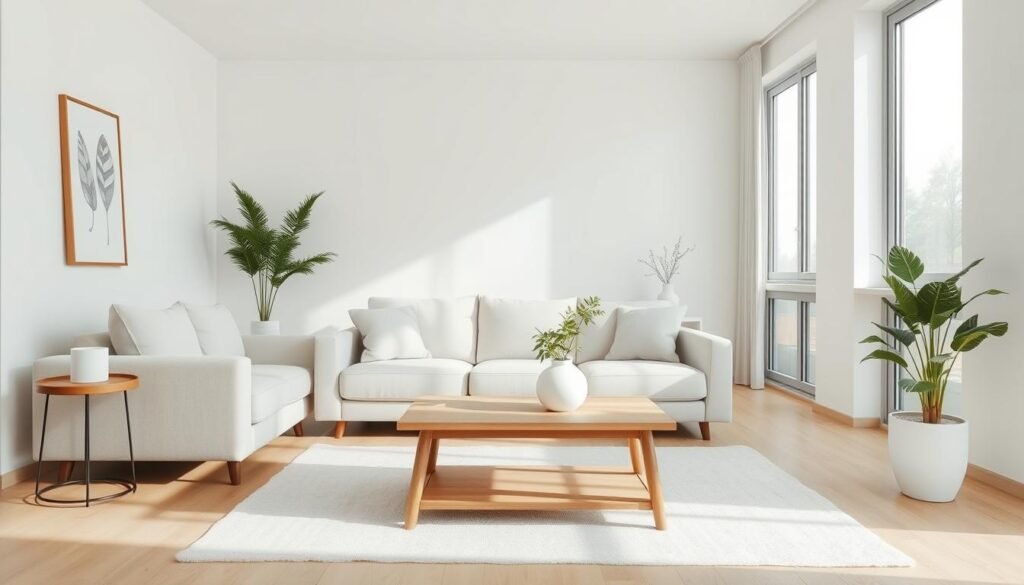
To keep sentimental items in a minimalist home, use shelves to stay organized21. Embracing simplicity means choosing fewer items but with more thought, making each piece count22. For items that don’t fit the decor, consider a “sentimental box” to help decide what to keep21.
Minimalism has been popular in design for decades23. To enhance it, use lots of natural light and furniture with clean lines23. Plants, featured in 16% of ideas, bring life and color to minimalist spaces2322. Transparent frames also add depth to wall art, making each piece stand out22.
Organizing everyday spaces with intention is key to simplicity living22. Textured accessories, found in 32% of ideas, add warmth23. Creating a small gallery wall with varied sizes and finishes can be a room’s centerpiece22. This approach helps keep a gallery cohesive and shows off personal style.
Choosing photos with similar themes helps create a cohesive look22. Adding greenery, suggested in four ideas, brings nature indoors23. Displaying accessories on floating shelves improves visibility and balance22. Using frame-free photo holders for rotating displays keeps the space lively and organized22.
Challenges and How to Overcome Them
Starting a minimalist journey has its minimalist challenges. Many find it hard to know where to start, convince a spouse or part with gifts or pricey items24. A Facebook community shared over 25 responses, revealing 12 major struggles24.
Dealing with pressure from family and friends to buy more is a big hurdle. Starting small and understanding your reasons can help24. Feeling restricted by fewer choices after decluttering is also common24. Remember, changing your life can face resistance from others24.
“Embracing minimalism is a step towards living out one’s truth and inspiring others through positive change.”
Guilt and fear are normal when simplifying your life24. Minimalism brings benefits like less distraction, helping you live fully25.
Here are ways to tackle these minimalist challenges:
- Begin by decluttering one room at a time.
- Talk openly with family about the benefits of simplicity.
- Donate or recycle items to feel good about letting go.
- Think about the mental and emotional space you gain, not just what you lose.
Success comes from regularly checking your goals and enjoying the freedom of minimalism.
Minimalism and Environmental Impact
In today’s world, embracing minimalism is key to living sustainably. Every item made and impulse buy harms our planet. It uses up resources, pollutes, and creates waste26. By cutting down on new products, minimalism helps save the planet’s resources26.
Reducing the Ecological Footprint
In 2018, Americans threw away 292.4 million tons of waste. This shows we need to change how we live27. Minimalism promotes using durable items, cutting down on waste and replacements. This reduces our impact on the environment26.
People in eco-friendly communities, like food co-ops and ecovillages, also have a smaller footprint. They use 16% less resources in clothes and food27.
Sustainable Living Choices
Making eco-friendly choices is vital for a smaller footprint. The EPA says green products are safer for us and the planet28. We can choose cleaner energy, greener products, and reduce waste28.
Minimalists have a 23% smaller carbon footprint than most. They support brands that care about the environment and use recycled materials27.
| Environmental Impact | Statistics |
|---|---|
| American Waste Generation in 2018 | 292.4 million tons27 |
| Conscious consumerism impact | 78% recognise sustainability importance in purchases27 |
| Green product adoption | Less harm to health and environment28 |
| Reduced carbon footprint in minimalism | 23% smaller footprint27 |
| Eco-friendly community impact | 16% lower environmental effect27 |
Small, eco-friendly habits can make a big difference26. Choosing minimalism simplifies our lives and helps the planet.
Embracing Minimalism and Parenting
Embracing minimalist parenting can change a family’s life. It leads to less stress and a simpler way of living. This makes the bond between parents and children stronger.
Children with fewer toys tend to play more creatively. This is good for their development29. Parents also find it easier to manage their time, which means more quality time with their kids30.
Minimalism helps kids with their emotional health too. It creates a calm space for them to think and feel29. Parents learn to teach their kids the value of balance and rest.
Minimalist parents teach their kids to be thankful and to help others. This approach makes kids appreciate what they have29. It also encourages them to volunteer and help in the community.
Too much screen time can harm kids’ mental health29. Minimalist families focus on physical activities and play. This is good for kids’ health and well-being29.
Many moms find peace and better parenting skills in minimalism30. Starting small, like ten minutes a day, can lead to big changes30.
Quality Over Quantity: Choosing What Matters
Living a minimalist lifestyle means we focus on quality over quantity in all areas of life. We choose high-quality items to avoid clutter and align with our values. This shift helps us value a few special items over many.
Millennials are leading this trend, with many embracing minimalism as a way of life31.
Choosing a minimalist wardrobe simplifies our lives and saves money. For example, owning just 14 black t-shirts and 5 pairs of black chinos makes getting ready fast32. Plus, buying quality items means we don’t need to replace them as often, which is good for the planet32.
Minimalism also brings emotional benefits. Cleaning up our spaces can make us feel relieved and happy31. It also helps us deal with toxic relationships, making our social lives better31.
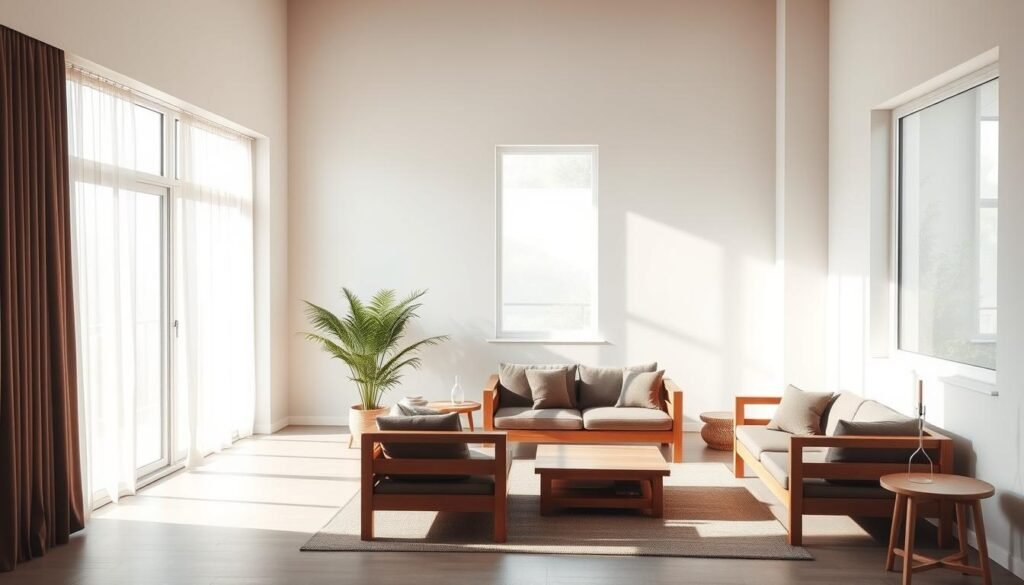
Embracing Minimalism makes our lives easier by reducing decision fatigue. With fewer choices, we can focus on what’s important32. It also helps us manage our time better, leading to success in school and work31.
- Significant financial savings by investing in high-quality items32.
- Emotionally rejuvenating benefits of decluttering31.
- Improved decision-making skills due to fewer, but purposeful, choices32.
In short, focusing on quality over quantity is key to the minimalist lifestyle. It brings real benefits to our lives, helping us live more intentionally and sustainably. This approach leads to fulfillment and clarity.
Real-Life Examples of Minimalist Transformations
Minimalism can change many parts of life, like how we feel and our money. Let’s look at some stories and testimonials that show these big changes.
In the clothing industry, many people have cut down to just a few outfits. One person went from over a hundred shoes to just the basics. This shows a big change in how we buy and use clothes33.
In the real estate market, someone moved from a big townhome to a tiny studio. This shows how living simply can make our homes more meaningful and efficient33.
Minimalism also changes how we shop. People used to buy a lot, but now they think more about what they need. This change helps them live more intentionally3334.
In career development, minimalism can lead to new paths. For example, someone left a boring job to start a blog. This brought them both money and happiness3334.
Minimalism also helps in the financial sector. By spending less, many people got out of debt and saved more. Richard Reis, for instance, saved more money than ever before after going minimalist3334.
Entrepreneurship is another area where minimalism makes a difference. It allows people to start their own businesses and follow their dreams more freely33.
Self-Improvement
Minimalism also helps in self-improvement. It encourages people to question their beliefs and live more in line with their values. This leads to a more fulfilling life33.
The effects on psychology and well-being are huge. Many people feel less stressed and anxious. Getting rid of clutter brings peace and clarity, improving mental health33.
Lastly, in the travel and lifestyle industry, minimalism leads to simpler living. It lets people travel more and build careers around their passions. This shows how minimalism can lead to big life changes3334.
| Industry | Before | After |
|---|---|---|
| Clothing | Excessive items, over a hundred pairs of shoes | Capsule wardrobe, only essential items |
| Real Estate | Two-bedroom townhome | 140 sq. ft. studio apartment |
| Consumer Behavior | Accumulates possessions mindlessly | Intentional living |
| Career Development | Unfulfilling jobs | Blogging, flexible work |
| Financial | Debt, paycheck to paycheck | Debt-free, savings increase |
| Entrepreneurship | Traditional job | Self-employment |
| Self-Improvement | Cluttered life | Aligned with values |
| Psychology & Well-Being | Stress and anxiety due to excess possessions | Peace and clarity |
| Travel & Lifestyle | Conventional lifestyle | Simple, intentional living |
Minimalism and Increased Productivity
Living a minimalist life boosts increased productivity and minimalist productivity. It helps us get rid of distractions and focus on what’s important. This makes our workspaces clearer and more efficient.
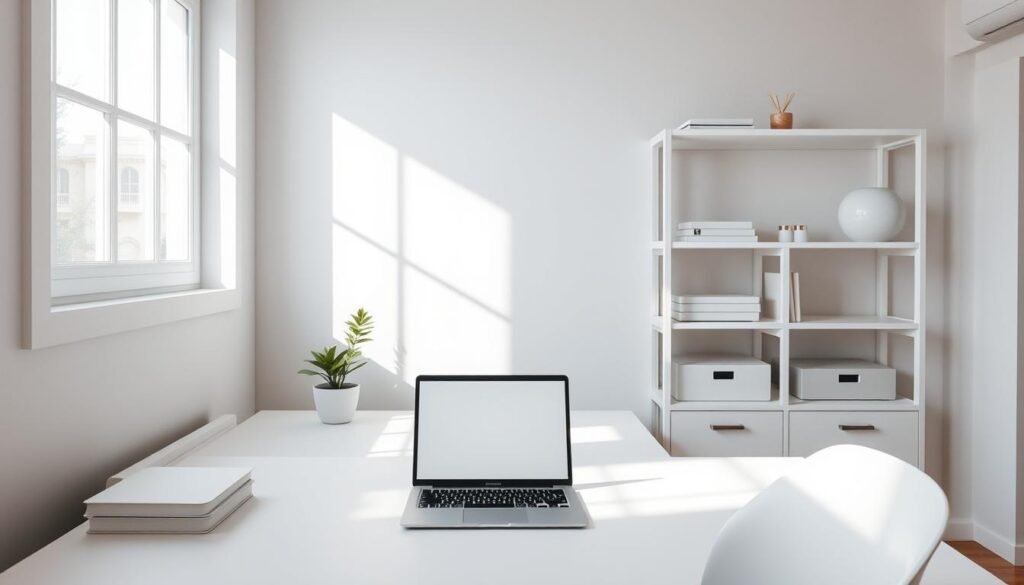
Clarity and Focus
Minimalism brings mental clarity and focus. Getting rid of clutter lets us focus better on our tasks35. Many people find better mental health by cutting out distractions and concentrating on key tasks36.
This clear thinking boosts increased productivity in work and life.
Time Management
Minimalism also helps with time management. It makes our spaces less cluttered and helps us focus on what’s important37. People who live minimally often work more efficiently and productively36.
This approach makes our workflow better and ensures we spend time on goals. It helps us reach the best minimalist productivity levels.
Conclusion
Our journey into minimalism has shown us deep insights into this life-changing lifestyle. It’s not just about looks; it’s about living with purpose and enjoying simplicity. By following minimalist ways, we gain huge benefits like less stress and clearer minds.
64% of people who decluttered say they feel better38. Minimalism helps us organize our homes, clean up digital clutter, and think more about what we buy. It makes our lives more balanced and meaningful.
It also improves our money habits. For example, a simple wardrobe can cut fashion spending by 28%39. And, 72% of minimalists save more money38. Plus, it’s good for the planet, helping us live more sustainably3839.
Let’s all take steps to simplify our lives. Starting small can lead to big changes. By focusing on experiences and being thankful, we find true happiness in minimalism. Let’s start this journey with excitement and purpose.
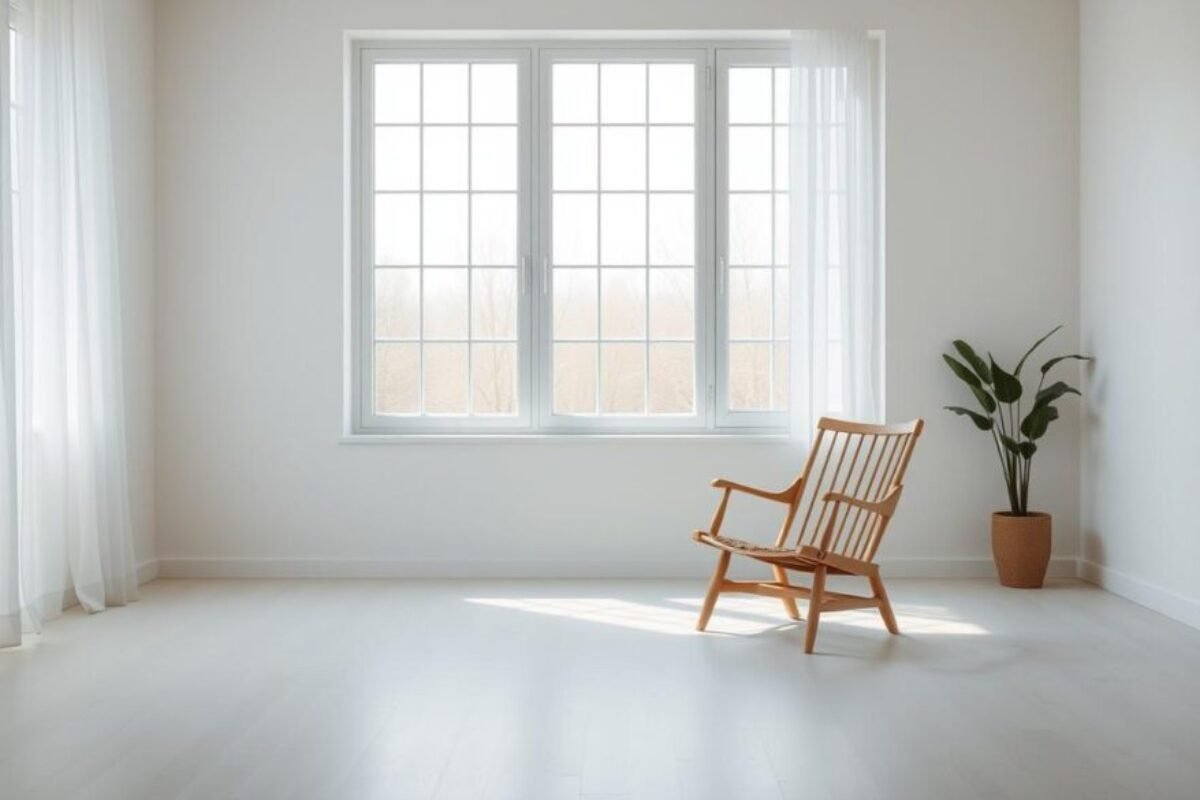




January 3, 2025 @ 4:37 am
Thank you for featuring and referencing my article on Digital Minimalism in your fantastic piece!